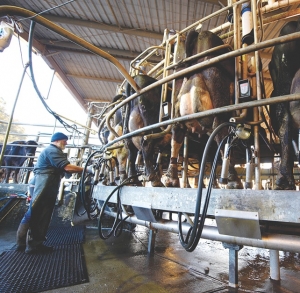Australian Dairy Farmers (ADF) president Noel Campbell says recent indications are that New Zealand dairy exporter Fonterra can’t increase production fast enough to meet Chinese demand, highlights the scale of the potential opportunity.
California’s Milk Producers Council says Chinese demand for dairy products is not likely to wane anytime soon. The middle class there continues to grow, as does their dairy product consumption.
“Chinese imports are growing further due to a decline in domestic milk output,” the council says. “While data on the Chinese dairy industry is murky at best, there are widespread reports of declining cow numbers and milk production deficits.
“One Chinese official estimates that, due to high beef prices and poor farm-level economics, the Chinese dairy herd has lost two million cows in the past year. The same official estimates that milk production is 20% lower than a year ago. If China has indeed suffered such a decline in milk output, then the pent-up demand for milk powder could be astounding. Chinese milk powder buyers kept imports minimal this summer and fall in the wake of the New Zealand drought. Now that their preferred supplier is back in the game the Chinese are buying with abandon.”
China bought a record-breaking 93,151 tonnes of whole milk powder in November, up 72% from already high import volumes in October and almost triple the year-earlier volumes. New Zealand accounted for more than 90% of the total, China also imported 23,158 tonnes of skim milk powder, up 152% year-on-year.
“The scale of China’s thirst for dairy, in particular milk powders, is absolutely unprecedented and the fact that a global dairy giant like Fonterra has said that it cannot currently meet that demand, tells us a great deal,” Campbell says. “This presents a tremendous potential trade opportunity for Australia, on top of the nearly A$3 billion worth of products the dairy industry exports annually.
Campbell says Australian farmer-owned co-operative, Murray Goulburn has reported global demand for dairy, whole milk powder in particular, has been at near record levels for an unprecedented period of time.
“In meeting this demand, we need a Free Trade Agreement (FTA) with China that removes roadblocks to export growth and delivers meaningful commercial outcomes for the local industry, sooner rather than later,” Campbell says
The ADF is promoting the need for Australian FTAs with China and Japan.
“We understand an FTA with China will not be easy, however the potential benefits to Australian dairy and therefore the economy as a whole, are only too clear to see,” Campbell says. “Opportunity knocks, and we must be ready to embrace it.” China is the Australian dairy industry’s largest international market with 72,516 tonnes of produce exported in the 2012-13 financial year, while New Zealand, which has an FTA with China, supplied 716,400 tonnes.

















